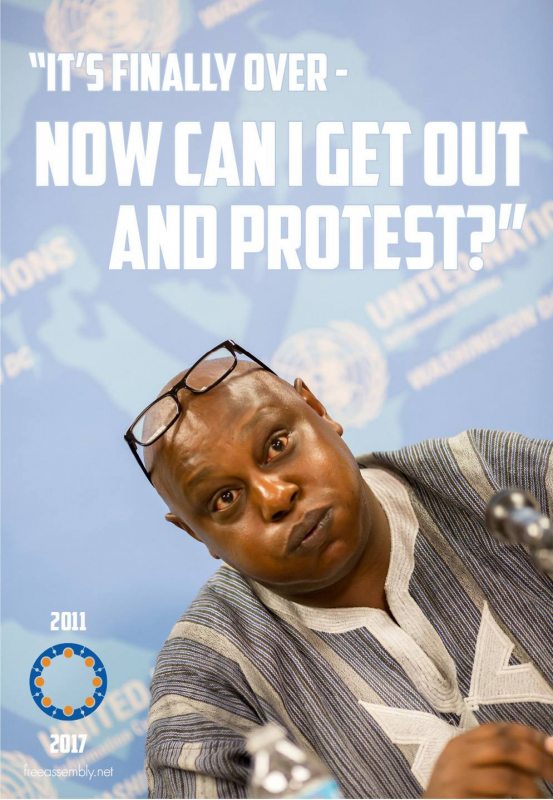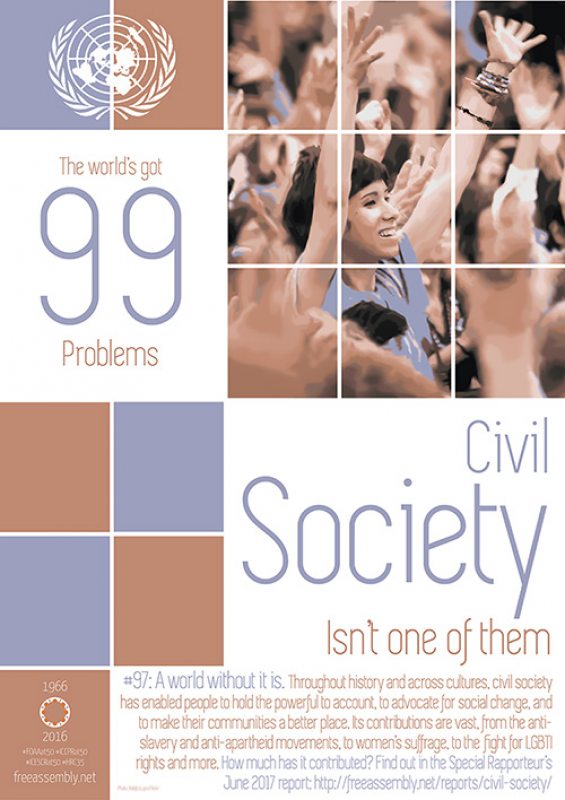“See you on the streets”: Kiai completes term as Rapporteur
Maina Kiai completed his term as United Nations Special Rapporteur on the rights to freedom of peaceful assembly and of association on April 30, after serving in the position for six years. His successor, Ms. Annalisa Ciampi of Italy, took up her functions as Special Rapporteur on May 1.
During his time as Special Rapporteur, Kiai conducted nine official country visits – to Georgia, the United Kingdom (twice), Rwanda, Oman, Kazakhstan, Chile, the Republic of Korea, and the United States of America. As of April 30, there were 10 pending invitations to the mandate, which Kiai’s successor can consider.
Kiai also authored six reports to the Human Rights Council and four to the General Assembly, on: best practices for promoting assembly and association rights; civil society’s right to access resources; threats against at-risk groups; assembly and association rights in the context of natural resources; fundamentalism; civil society’s positive contributions; elections; multilateral organizations; disparate treatment of businesses and associations; and labor rights. He also co-authored a report giving practical recommendations for the management of assemblies with the former Special Rapporteur on summary or arbitrary executions, Christof Heyns.
Kiai’s mandate also published a wide range of supplementary materials to expand on his work, including a factsheet series, annual reports, toolkit reports, promotional posters, and an online compilation of legal-arguments to use in court cases involving assembly and association rights. The latter grew out of Kiai’s litigation project, which he used to intervene in a number of assembly and association rights-related cases around the world.
In an open letter published on May 1, the former Rapporteur thanked everyone who has contributed to the mandate over the years.
“Your work, input and dedication was crucial in helping the mandate accomplish so much in its first six years of its existence,” Kiai wrote in his letter. “Your efforts truly made the mandate yours – a vehicle of the people it’s supposed to represent.”
“I know all too well that these are especially trying times for those of us working in human rights. If it’s any consolation, know that you are not alone. And know that while I may no longer be Special Rapporteur, I am not stepping away from our struggle. To the contrary, I will be joining you – in our protests, in our communities, and in the halls of power. See you on the streets.”
“Has civil society made the world a better place? Where and when has civil society made concrete and identifiable achievements? What would the world look like without civil society?” These are the central questions that the UN Special Rapporteur on the rights to freedom of peaceful assembly and of association, Maina Kiai, addresses in this, his final thematic report to the United Nations Human Rights Council.
“Imagine a world without civil society,” Kiai writes in the report. “That world is bleak.”
The Report will be presented in June by his successor, Ms. Annalisa Ciampi.
The Special Rapporteur mandate was created by the Human Rights Council in September 2010, and renewed in 2013 and 2016. In creating the mandate in 2010, the Council recognized that assembly and association rights are essential components of democracy and called upon States to respect and fully protect the rights of all individuals to assemble peacefully and associate freely.
Kiai sent two requests to visit Belarus, in 2011 and 2013. However, the government has not replied with an official invitation.
Meanwhile, the country’s human rights organizations have been involved in active communication with the Special Rapporteur. They informed Mr. Kiai about the facts of violations of freedom of peaceful assembly and association. The Human Rights Center "Viasna" and the Belarusian Helsinki Committee last sent a message in late March. The information concerned the detention of observers, human rights activists and journalists in the office of "Viasna" on Freedom Day, March 25. Maina Kiai then endorsed the statement by the Special Rapporteur on the situation of human rights in Belarus, Miklos Haraszti, regarding the restoration of the policy of mass repression against peaceful demonstrators, non-governmental organizations, journalists and political opponents.



















